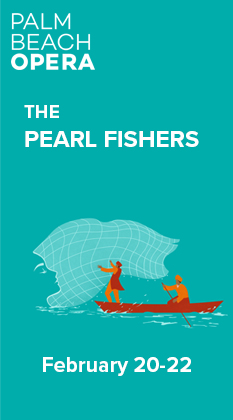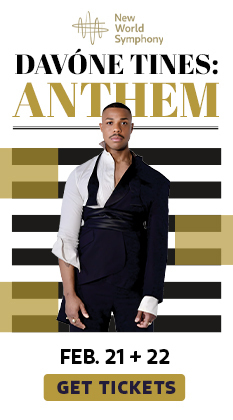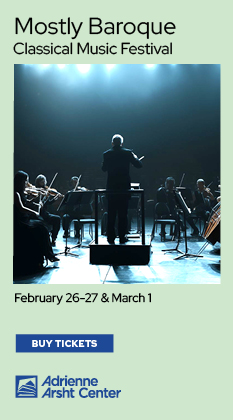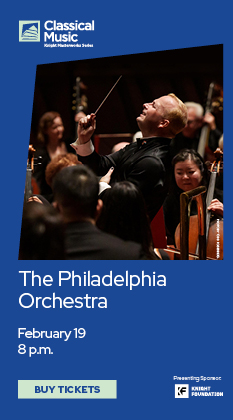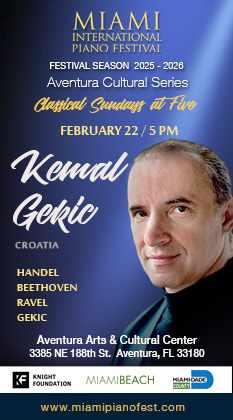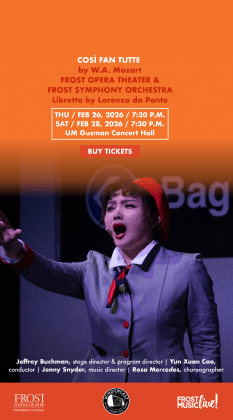MMF delivers a triumphant performance of “Ghosts of Versailles”

Thomas Cannon (center) as Figaro in John Corigliano’s “The Ghosts of Versailles” at the Miami Music Festival. Photo: Angelica Perez
This summer has marked a breakout season for the Miami Music Festival. Under the artistic direction of Michael Rossi, the institute for students and aspiring young artists has presented an ambitious mini-season of rarely produced operas with strong production values and vocal standards that have risen exponentially.
One of the festival’s most admirable ongoing projects has been its commitment to American opera. Previous summers have seen fine presentations of Robert Ward’s The Crucible and Jake Heggie’s Dead Man Walking.
On Friday night at Barry University in Miami Shores the festival presented the first of two performances of John Corigliano’s The Ghosts of Versailles, perhaps its most audacious venture to date.
Corigliano is one of America’s most acclaimed and gifted composers. His Symphony No. 1 is a powerful, post Mahlerian rumination on the death of friends due to the AIDS epidemic. His Clarinet Concerto has become standard repertoire for solo virtuosos of that wind instrument. A Latin-tinged Guitar Concerto and several fine song cycles deserve more frequent performances. Corigliano clearly has the creative talent and imagination to have written a significant opera. He ultimately chose to do something less.
The work that Corigliano and his librettist William M. Hoffman conceived utilizes characters and plot elements from the third of Pierre Beaumarchais’ trilogy of Figaro plays La Mère coupable (The Guilty Mother), the successor to The Barber of Seville and The Marriage of Figaro. Before the ghosts of the French court, Beaumarchais conceives a new play that will attempt to alter history. His familiar characters engage in a plot to rescue Marie Antoinette from the guillotine and send her to America.
This large-scale extravaganza might be subtitled “Broadway at the Opera.” Some of the imitation Rossini-Mozart sequences recall the quasi- operatic pastiches in Andrew Lloyd Webber’s Phantom of the Opera. The opera is a splashy, highly entertaining show with a huge cast and period scenic and costume requirements.
There are moments in the score when Corigliano’s sheer talent shines through, suggesting what the opera could have been if he had not opted for theatrical glitz. The eerie, harmonically bracing opening string figures, as the ghosts of King Louis XVI and his court assemble in the theater at the palace of Versailles, have real atmosphere. Beaumarchais’ aria “I risk my soul for you Antonia” is achingly beautiful. There is a lovely soprano-mezzo duet for Rosina and Susanna and a quartet in the final act (as the Count Almaviva and his family face execution) is eloquent and moving.
The songs and dances for the party at the Turkish embassy and the entertainer Samira, however, are downright corny, verging on the vulgar. Ultimately Corigliano’s ambition cannot be denied and there is some fine music along the way in this two act, nearly three-hour (with intermission) operatic pageant.
That MMF managed to pull this work off successfully on the small stage of the Broad Auditorium was nothing short of a triumph. Director David Carl Toulson milked the characters’ eccentricities and the score’s big moments for all they were worth. Alyiece Moretto-Watkins’ sets, Josieu Jean’s projections and Rebecca and Herman Montero’s lighting effectively conjured up the palace’s elegant theater and ballroom, Almaviva’s former residence in Seville, the evil brain cells of the villain Bégearss and the prison. As in previous presentations, Patricia Hibbert’s stylish costumes balanced gaudy extravagance with historical accuracy.
For the most part, the formidable demands of Corigliano’s vocal and instrumental writing were admirably conveyed. In the pivotal role of Marie Antoinette, Sarah Ryman cut a dignified, tragic figure. Her large voice was opulent in the middle and lower registers but could turn tremulous under pressure at the top. Near the conclusion, the queen’s aria “Once there was a golden bird” was voiced by Ryman in resplendent tones.
As in the Rossini and Mozart adaptations of Beaumarchais’ plays, the role of Figaro takes center stage. Thomas Cannon was both vocal stalwart and entertainer extraordinaire as the jack-of-all-trades and schemer who solves the plot’s complications. His deep baritone soared in Figaro’s evocation of the heavens and his agile, quick patter was equal to Corigliano’s mock-Rossini ditties. When the surtitles system failed about fifteen minutes into the first act, Cannon’s outstanding English diction stood out for clarity, even at the highest extremes of his vocal range. (The translations were back up and running for Act II.)
Anthony Zoeller’s more supple baritone embodied the dignity of Beaumarchais and his love for the queen. The villainous Bégearss, who dreams of using the French revolution to become the ultimate dictator, was played with appropriately slimy insidiousness by D.C. Miles, a verbally distinctive tenor.
Jena Carpenter’s silvery Mozartean soprano brought stature to the somewhat colorless role of Rosina (the Countess Almaviva). The opera’s big tune is heard in a flashback scene as a duet between Rosina and the page Cherubino who has born her a son before dying in battle. While Daniela Petrolito’s timbre was lovely, her small mezzo sound was no match for Carpenter’s full bodied tones.
Mauricio Villanueva Espinosa was an aptly arrogant Almaviva who foolishly rejects Rosina’s son and refuses to see Bégearss’ treachery with the dulcet lyric tenor to rise to the final quartet.
Alyssa Click’s exquisite coloratura made the most of the limited opportunities for Florestine, Almaviva’s illegitimate daughter. Alonso Jordan Lopez was the amorous Léon, Rosina’s son and Florestine’s lover. His large tenor easily filled the house, making a cameo into something more striking. Susanna is a mezzo in this opera and Megan Saslow had the dark low voice and spunkiness to be her husband’s equal in horseplay and zaniness.
Christine Phares was half bel canto mezzo, half night club chanteuse in Samira’s Turkish vaudeville act (originally written for Marilyn Horne). Logan Tarwater had the low notes and haughty demeanor for Louis XVI, and Kristi Esch made the Woman with a Hat’s mad scene into a hilarious operatic burlesque. Christian Kas was a low bass indeed for Suleyman Paha’s solemn pronouncements and Javier Castellanos handled the Marquis’s laugh lines capably. Peter Bass was both scary and pitiful as Wilhelm, Bégearss’ unwilling sidekick.
Corigliano’s orchestral score is complex, at times thorny. Peter Grunberg masterfully conducted a scrupulous, well-ordered performance with the consistently fine student orchestra in peak form.
There is one remaining performance on Sunday afternoon, with a partially different cast, of a major score by one of America’s most significant composers that is unlikely to be heard in South Florida again.
The Miami Music Festival repeats The Ghosts of Versailles 2 p.m. Sunday at Barry University in Miami Shores. Maria Kerlee sings Marie Antoinette, Eric Asakawa is Bégearss, Ana Collado is Rosina and Shinhee Kim sings Florestine. miamimusicfestival.com
Posted in Uncategorized
Leave a Comment
Sat Jul 28, 2018
at 2:28 pm
No Comments
